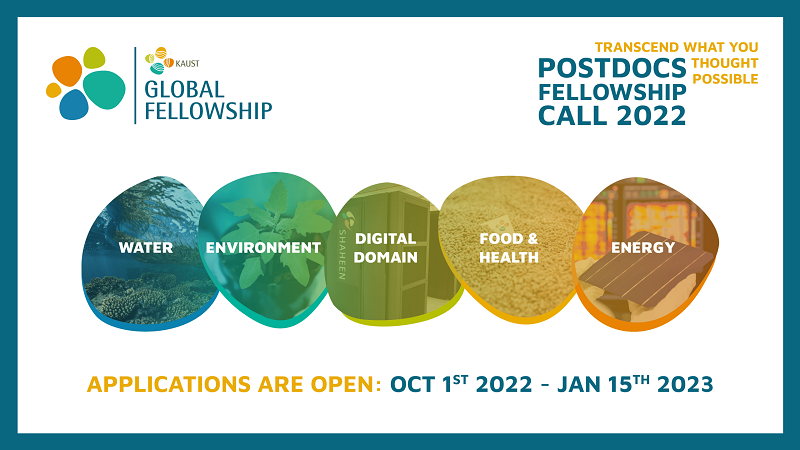Deadline: January 15, 2023
Applications are open for the KAUST Global Fellowship Programme 2022/2023. The KAUST Global Fellowship Programme is supporting research in line with the KAUST Five Research Pillars (Water, Environment, Digital Domain, Food & Health, Energy) and the programmes of KAUST academic divisions; Biological and Environmental Science and Engineering (BESE), Computer, Electrical and Mathematical Science and Engineering (CEMSE), and Physical Science and Engineering (PSE).
This is a unique opportunity to embark on a new journey, shape your future career trajectory and pursue your dream of being recognized for your research impact and excellence. The programme helps you transition towards a competitive independent research career and build your own future career path. KAUST Global Fellows are expected to live and work at KAUST and undertake work in one of the research laboratories on campus, in Saudi Arabia.
Benefits
- Each proposal receives an independent annual research budget of up to $45,000, along with a yearly living stipend of $75,000 plus benefits including medical insurance, accommodation, schooling, relocation, and travel allowances to focus on your independent research on a full-time basis.
- Easy access to research tools, equipment, unparalleled laboratory facilities and expertise working with your host Faculty Primary Investigator (PI) at KAUST. KAUST offers adequate support and opportunities to create impact through your research, whether it leads to a potential new discovery, invention, influential results and/or publications.
- Unlimited access to a variety of Learning & Development programmes including KAUST Mentoring Programme, Harvard Higher Education Teaching Certificate, and Leadership Programmes/Certificates. The Global Fellowship seminar shall also contribute to your personal & professional development with thematic sessions, VIP speakers, workshops, networking opportunities, and shared learning from the other fellows and alumni.
- KAUST facilitates the introduction and networking between the KAUST research community and a global set of external organizations operating in academia, industry, government agencies, funding bodies and other external partners towards the development of successful partnerships.
Eligibility
Applicant Eligibility
- Must be within four years of earning their Ph.D. or have a maximum of four years of post-Ph.D. research experience with a justified career break;
- Must expect to complete their Ph.D. prior to the start of their Fellowship;
- Must be ready to move in KAUST to undertake their proposed three-year research project. Candidates need to satisfy all Kingdom of Saudi Arabia requirements to obtain resident status;
- Must have a KAUST faculty member agreeing to host the applicant and support their independent research under this Fellowship, if successful. Applicants will need to include supportive evidence in regard to this agreement between them and the KAUST PI (e.g. Host PI support letter or email confirmation)
- People of all nationalities are welcome to apply. They encourage female applications for a better gender balance in science.
Proposal Eligibility
- Focus in one or more of the KAUST five Research Pillars: Water, Energy, the Environment, Food & Health, and the Digital domain
Have a 3-year duration - Follow the budget and financial guidelines of the call
- Use the templates provided
Application
Before applying, download and carefully read the instructions, materials and templates:
The following documents must be uploaded and submitted with the online application form:
- Most recent CV (max 4 pages)
- Research proposal (template)
- Two publications (links or attachments)
- KAUST Host PI letter (template)
- Two reference letters to be received from referees via email

